Head of the UGCC: Ukrainian and world community still waiting for the truth about the Holodomor
Monday, 21 November 2011, 23:01 The Ukrainian people and the whole civilized world are still waiting for a thorough study of the Ukrainian Genocide of 1932-1933 and for its myths to be debunked. This was stated by head of the Ukrainian Greek Catholic Church, His Beatitude Sviatoslav (Shevchuk), in New York, where he is on a pastoral visit.
The Ukrainian people and the whole civilized world are still waiting for a thorough study of the Ukrainian Genocide of 1932-1933 and for its myths to be debunked. This was stated by head of the Ukrainian Greek Catholic Church, His Beatitude Sviatoslav (Shevchuk), in New York, where he is on a pastoral visit.
Blessed Sviatoslav said that there is still very little information on the events of 1932-1933. In his opinion, not everyone in Ukraine has the courage to speak the truth about them. Often these events are hushed because of ideological or even opportunistic reasons.
He thinks it is positive that today at least no one can deny that Ukraine – the breadbasket of Europe – survived more than one famine. “This disaster for various reasons spread across the lands of Ukraine in 1921-1923, 1932-1933, and 1945-1946. However, the most terrible and artificially induced famine, which, fortunately, was never experienced by the other nations of the former Soviet Union, was the great famine of 1932-1933. Even today it is quite difficult to know the exact number of victims of this crime. Recent studies say that in one year at least four million people died,” said Patriarch Sviatoslav.
The head of the UGCC reminded that this artificial famine, which occurred during one of the most productive years of the Ukrainian black earth, was carefully planned by the government of the Soviet Union. According to the primate of the church, it was a test of the “the cheapest weapon of mass destruction in the world.”
He recalls, referring to documents, that the campaign of genocide against the Ukrainian people was carried out in three stages: first, the separation of the Ukrainian ethnic territory from the rest of the union and the creation of military, ideological and informational isolation; second, the forcible removal in stages of all food that the population had and that the land had produced that year; third, stopping any outside assistance to Ukrainians and not allowing them to seek food elsewhere, all which lead to the gradual death of millions of people from the terrible agony of hunger.
His Beatitude Sviatoslav, referring to the experience of eyewitnesses, said that hunger is worse than concentration camps. “One woman who survived the famine in childhood, and who later was a prisoner in Auschwitz, comparing these two tortures said hunger is something far more terrible than the concentration camp, because even in the camp they were given something to eat. All those who miraculously survived the Holodomor unanimously say that hunger is something more terrible than even war, because one still had a chance to escape war, but from such artificial destruction of salvation there was virtually no chance,” said the head of the church.
Like the tragic events of the Jewish Holocaust (Shoah) and the Armenian genocide, the recent events of the Rwandan genocide, some want to hide the Ukrainian Famine in the unknown pages of history, but the pain that the Ukrainian people experienced touched such deep foundations of all humankind that its wounds are felt not just by one nation.
Blessed Sviatoslav is of the opinion that hunger not only destroys the body but also “deeply affects the human soul, engenders in it fear that paralyzes the will to resist the ideology that takes away freedom, and this fear is transmitted from generation to generation. These wounds can be healed only by memory.” That is why, in his opinion, to remember these events is important not only in order to heal the wounds of the past but also to prevent the recurrence of similar crimes in the future.
And so he believes that today the act of remembering the Ukrainian Holodomor is very important not only for Ukrainians in the United States and Ukraine but also for all people of goodwill in the world: “Remembering the tragedy of the Ukrainian famine, we first want to heal our memory, to heal the wounds that are still causing us pain and bleeding.”
However, His Beatitude Sviatoslav said that in remembering the Ukrainian genocide, “we are not looking for enemies on whom we would like share our pain and take revenge. We are a Christian nation. This memory is called on by our Christian conscience, which wants to proclaim to the world the truth about these events and through truth prevent new crimes against humanity of any ideology,” concluded the head of the church.
The requiem for the victims of the Holodomor of 1932-1933 was held on Saturday, November 19, in the Cathedral of St. Patrick. The service was attended by Archbishop Stefan Soroka, Metropolitan of Philadelphia, Bishop Paul Chomnycky, Eparch of Stamford, Bishop Basil Losten, Bishop Emeritus of Stamford Eparchy, Archbishop Antony and Bishop Daniel, the bishops of the UOC in America, numerous clergy of the Ukrainian Greek Catholic and Orthodox Churches. More than two thousand faithful commemorated the Holodomor victims and prayed with His Beatitude Sviatoslav.
UGCC Information Department
LATEST NEWS

We can imagine what the prayer of the prisoners in the Russian torture centers in the Ukrainian Kharkiv region was like – Head of the UGCC on the 206th day of the war 17 September
A vast cemetery, a mass burial, was found near the city of Izyum, in which more than 400 innocently killed and tortured people have already been...
-
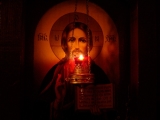 Глава УГКЦ у 158-й день війни: «Нехай Господь прийме з уст нашої Церкви псалми та моління за всіх тих, які особливо просять нашої молитви»
Глава УГКЦ у 158-й день війни: «Нехай Господь прийме з уст нашої Церкви псалми та моління за всіх тих, які особливо просять нашої молитви»
-
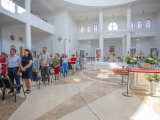 «Сила, яка походить із вірності Христові, є стержнем, який ніхто не може зламати», – Блаженніший Святослав
«Сила, яка походить із вірності Христові, є стержнем, який ніхто не може зламати», – Блаженніший Святослав
-
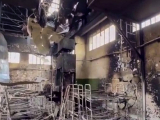 Глава УГКЦ у 157-й день війни: «В ім’я Боже ми засуджуємо звірства в Оленівці і світ повинен це засудити як особливий вияв дикості й жорстокості»
Глава УГКЦ у 157-й день війни: «В ім’я Боже ми засуджуємо звірства в Оленівці і світ повинен це засудити як особливий вияв дикості й жорстокості»
-
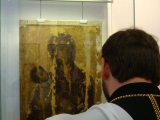 «Боже, почуй наш плач і поспіши нам на допомогу і порятунок!», – Глава УГКЦ у 156-й день війни
«Боже, почуй наш плач і поспіши нам на допомогу і порятунок!», – Глава УГКЦ у 156-й день війни
-
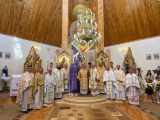 «Бог йому дав серце і душу українського народу»: відбулася щорічна проща до Прилбичів з нагоди уродин митрополита Андрея Шептицького
«Бог йому дав серце і душу українського народу»: відбулася щорічна проща до Прилбичів з нагоди уродин митрополита Андрея Шептицького
-
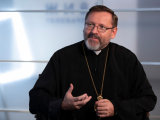 Глава УГКЦ: «Я горджуся українськими патріотами, які без найменшої краплі ненависті готові захищати своє»
Глава УГКЦ: «Я горджуся українськими патріотами, які без найменшої краплі ненависті готові захищати своє»
-
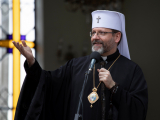 Блаженніший Святослав закликав українську молодь скласти присягу на вірність Христові
Блаженніший Святослав закликав українську молодь скласти присягу на вірність Христові
-
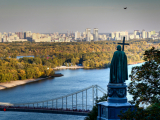 Глава УГКЦ у 155-й день війни: «Помолімося, щоб не втратити скарбу віри князя Володимира»
Глава УГКЦ у 155-й день війни: «Помолімося, щоб не втратити скарбу віри князя Володимира»
-
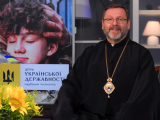 Блаженніший Святослав у День державності України: «Наша Держава – це для нас питання життя або смерті»
Блаженніший Святослав у День державності України: «Наша Держава – це для нас питання життя або смерті»
-
 Глава УГКЦ у 154-й день війни: «Нехай Господь Бог прийме у свої вічні обійми журналістів, які віддали за правду своє життя в Україні»
Глава УГКЦ у 154-й день війни: «Нехай Господь Бог прийме у свої вічні обійми журналістів, які віддали за правду своє життя в Україні»
-
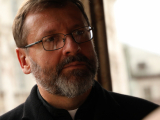 Глава УГКЦ у 153-й день війни: «Принесімо наш біль перед Боже обличчя і будьмо певні, що Він нас вислухає»
Глава УГКЦ у 153-й день війни: «Принесімо наш біль перед Боже обличчя і будьмо певні, що Він нас вислухає»
-
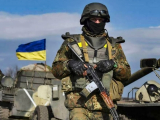 Глава УГКЦ у 152-й день війни: «Помолімся молитву заступництва за наших воїнів»
Глава УГКЦ у 152-й день війни: «Помолімся молитву заступництва за наших воїнів»
-
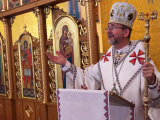 «Віруюча людина не може бути байдужою, коли бачить страждання іншої людини», – владика Богдан Дзюрах
«Віруюча людина не може бути байдужою, коли бачить страждання іншої людини», – владика Богдан Дзюрах
-
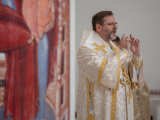 «Серед нашого страждання творімо простір для прояву Божої всемогутності», – Глава УГКЦ у 6-ту неділю після П’ятдесятниці
«Серед нашого страждання творімо простір для прояву Божої всемогутності», – Глава УГКЦ у 6-ту неділю після П’ятдесятниці
-
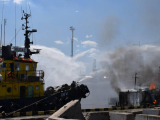 Глава УГКЦ у 151-й день війни: «Російське віроломство ми перемагаємо силою любові до нашої Батьківщини»
Глава УГКЦ у 151-й день війни: «Російське віроломство ми перемагаємо силою любові до нашої Батьківщини»

